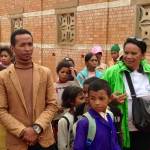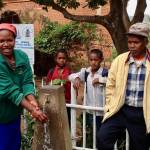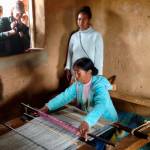
Mayor Rija Rakotoarimanana and Hanta Ranatenaintsoa, director of the FJKM Crafts Unit attended the celebration in Mahatsinjo.

Our group visited several of the spigots supplied by the reservoir from the gravity water system.

Blandin is one of the resident weavers who demonstrated the creation of the silk scarves. A typical scarf takes a full day to complete.
We turned off the national road onto a deeply rutted dirt road that took us to the village of Mahatsinjo. The village, four miles away at the end of the road, had 25 homes, a Catholic Church, and a school.
The district mayor and the vast majority of the town and children welcomed us. After a worship service led by the catechist of the nearest FJKM church and speeches of welcome from community leaders, Hantamalala Ranatenaintsoa, director of the crafts unit of the FJKM Development Department (SAF/FJKM), shared a brief history of the relationship between SAF/FJKM and the cluster of communities in the Mahatsinjo area. Hanta became involved with the communities in 2002 at the invitation of one of the village elders. She explained SAF/FJKM’s approach to development, which emphasizes working with the whole community, regardless of faith, and helping people to identify their own priorities. Over the past 15 years, SAF/FJKM has provided training on household economics and helped the communities to revive traditional silk production and weaving, to develop a clean water source, and to propagate fruit trees.
Hanta and the villagers were eager to lead us on a walking tour of the town to see the work they had done with support from the FJKM and the Presbyterian Church (U.S.A.).
The project that had the most far-reaching implications for the villagers was the water system, which benefits 853 people in the community plus 220 students at the local school. Residents had laid more than two miles of pipes to carry the water from a spring a mile away to a reservoir, and then to nine spigots all over town. Each spigot had a sign with the logos of SAF/FJKM and the PC(USA) as the initiative had been funded in part by the Presbyterian Hunger Program. A water management team oversees the system, which also serves toilets and a shower at the school and provides irrigation and, in the rainy season, water for fish ponds.
The primary school has eight teachers and five classrooms, but that’s not enough for the 220 pupils. Some of the children don’t get enough to eat. Two students have fainted from hunger during class. The students play soccer and basketball. The school just completed a basketball court, but we heard that they don’t even have a ball!
In 2011, the townspeople started a fruit orchard with seedlings and training provided by SAF/FJKM. A central nursery provides plant material that the 74 residents trained in grafting techniques can use to propagate fruit trees. Now there are 56 varieties of fruit trees in the area. Florent, one of the most successful farmers, showed us close to 500 apple trees that he had grafted. Villagers had also grafted hundreds of peach and persimmon trees. Community members have generated income by selling 1079 trees. In addition caring for the trees, the residents tended chickens, pigs, and cattle.
A number of the townspeople spin silk thread that they use to weave intricate scarves using looms in their homes. The beautiful scarves are not only a form of artistic expression, but they provide additional income as well. SAF/FJKM helps by marketing the scarves through a shop in the capital, Antananarivo.
All of these activities were made possible by access to water. Clean, accessible water made all of the difference in the lives of people.
The Presbyterian Church (U.S.A.) partners with the FJKM to bring life to the community. We thank God for faithful people like Dan and Elizabeth Turk and Doug Tilton, who provide encouragement, technical support and partnership to bring opportunity to the village at the end of the difficult road.
Contributed by Kirk Perucca, pastor of Covenant Presbyterian Church in Kansas City, MO
About the Travel Study Seminar –
The Presbyterian Church (USA)’s partner, the five million-member Church of Jesus Christ in Madagascar (known by its Malagasy acronym, FJKM), has multifaceted and holistic ministries that seek to respond to the challenges of poverty, human exploitation, social and political conflict, and environmental degradation as an integral part of what it means to follow Christ.
A group of ten US Presbyterians is visiting Madagascar November 7 to 17 under the auspices of the Presbyterian Peacemaking Program and Environmental Ministries to learn more about the FJKM’s various ministries of reconciliation and peace-building, as well as its efforts to promote sustainable human development whilst protecting the integrity of creation.
The group includes Rev. Carl Horton, the coordinator of the Peacemaking Program, and Douglas Tilton, the PC(USA)’s Regional Liaison for Southern Africa. In-country leadership is provided by PC(USA) Mission Co-workers Dan and Elizabeth Turk and two representatives of our FJKM hosts: Pastor Lala Rasendrahasina, the immediate past President of the FJKM, and Pastor Lala Nirina Rakotoarisoa, the former head of the FJKM’s Chaplaincy Program.